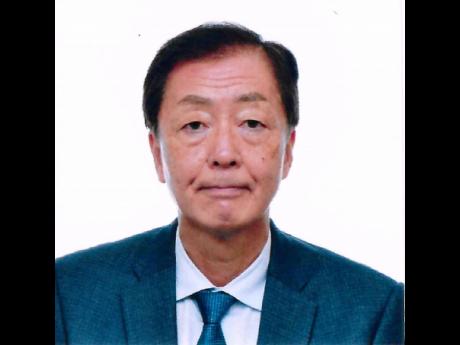Yasuhiro Atsumi | Is Jamaica a ‘Confounding Island’?
Before I travelled to Jamaica last December to become Ambassador of Japan to Jamaica, I asked my predecessor which books I should read to understand Jamaica. He immediately recommended The Confounding Island, by Orlando Patterson in 2019. He was a sociology professor at Harvard University and, as I later learnt, he has produced the “Patterson Report” on Jamaican education.
I have read that book several times, and it is like the Bible to me to understand Jamaica. He argues that Jamaica has so many confounding puzzles and paradoxes to explain, and it has the very best things and the very bad things all together.
Jamaica’s Westminster-style democratic country with the two-party parliamentary system is working well. Each party has been elected to form a government through national elections with relatively high voter turnout rates. It amazes me that the two parties have been in dead heat in forming the ruling government. After independence, JLP has been in the government for 29 plus years and PNP for 31 plus years! Also, Jamaica enjoys enough freedom of speech. Jamaica’s World Press Freedom ranking is the 32nd among 180 countries this year (the 12th in 2022, the seventh in 2021), much better than the 68th position of Japan. At the same time, Jamaica suffers tragically from crime and violence. The murder rate in Jamaica has been the first or the second highest in the South and Central American region for the last several years. Patterson argues that this combination of high democracy and high violence contradicts the “Democratic Peace Theory,” which maintains that democracy promotes peace (less violence).
On the economic front, at the time of Independence, both Jamaica in 1962 and Barbados in 1966 were in a similar economic situation with a similar colonial history behind. Unlike Trinidad and Tobago, both countries have no oil resources for economic growth. However, Barbadian economy has grown much faster than Jamaican. The Barbados’ per-capita GDP was US$3,400 at independence and now it is about US$20,000, while Jamaica’s per-capita GDP was US$2,200 at independence and now it is about US$6,000, less than one-third of Barbados. This means that Barbadian per-capita GDP grew about six times after independence, while Jamaican per-capita GDP grew only about three times. Even though we cannot simply compare the two countries because of the population size difference (Jamaica with 2.8 million, Barbados with 0.28 million, one-tenth of Jamaica, at present), why has Jamaica trailed Barbados in terms of economic development after independence? Is this because of the geographical difference that Jamaica is an extremely mountainous island, while Barbados is a flat coastal island? Did the neo-liberalist IMF do bad things to Jamaica, while the same IMF did good things to Barbados? Have the policies of the successive governments of Jamaica, such as the policies on education, been inappropriate? Or is it because Jamaica has failed to produce a seizable number of middle-class populations?
FASTEST RUNNERS
The most fascinating chapter of the Patterson’s book is on the issue of why Jamaicans, living in a little island, not as large as Connecticut of the US, of less than three million people, produce the fastest runners in the world. This August, Jamaican athletes performed very well, as always, at the World Athletics Championships in Budapest, Hungary. They won 12 medals, which was the second largest, next to 29 medals by the US’ athletes. The vast majority of people of the Caribbean are of West African ancestry, mainly from the area of Nigeria and Ghana. But Jamaicans predominantly excel in athletics, neither Nigerians nor Trinidadians. So, this seems to be not because of genetics.
I had a chance to meet with Usain Bolt in Tokyo, just before I came to Jamaica, and asked the same question why Jamaicans, especially he, are the fastest runners in the world. He told me “I don’t know!” If he does not know the answer, we may be satisfied with no answer. But Patterson argues for several historical and institutional reasons to explain. One of his reasons is the efforts of a Jamaican National Hero, Norman Manley, who was a top-star athlete himself, to make Jamaican athletes a pride of Jamaica at the time of independence. Another reason is a virtuous cycle of the effect of “Champs”, which attracts students, parents, coaches and all the other stakeholders in engaging in athletics for fame and money.
Thinking about athletes, another puzzle for me is that while Jamaicans drive cars amazingly fast (and carelessly, too), which I feel is like sprinting 100m like Usain Bolt, Jamaicans very seldom come and arrive on time. There is a word called “Jamaican time”! If he is in a hurry to drive, he should be able to come on time. This is a mystery for such a person like me, who comes from a very punctual Japanese culture.
CONFOUNDING PUZZLE
Another confounding puzzle for me is that Jamaica seems to be a female-oriented society, even though there are so many domestic violence against women. The latest data from the ILO shows that Jamaica ranks the fourth highest (56.99 per cent) from 189 countries in the percentage of female managers, much higher than the 167th of Japan (14.75 per cent). This female-oriented society may come from a matrilinear family system inherited from West African societies. But it is still amazing to hear that about 80 per cent of the university students in Jamaica are women, and most of the managers in governmental offices that I happen to encounter are women, including the Ministry of Foreign Affairs and Foreign Trade. I always admire the excellent works of the female (and male) executives at the ministry, including Minister Kamina Johnson Smith. This female domination may be a good thing for Jamaican democracy too. But I am wondering what happens with Jamaican men. In the meanwhile, there happens massive domestic violence against women by men. Do some foolish men go for domestic violence to release their stress out because of their indebtedness to women economically?
While I am muddling through these puzzles and paradoxes, Jamaica looks to be in a good position for progress.
Right now, Jamaica’s economic situation is very promising. Jamaica’s GDP has been expanding in nine consecutive quarters after COVID-19, with an expanding tourism sector, the lowest unemployment rate, lowering debt/GDP ratio, expanding exports, stable inflation rates, the highest credit rating by S&P and Moody’s. Even the IMF is applauding Jamaica for its sound fiscal and economic management. Some economists say that Jamaica has the best managed economy right now since independence. In addition, the number of crimes, especially murders, has decreased a little bit this year from last year. On the political front, Jamaica is heading forward for a Republic, which many people claim to be “true” independence.
I completely agree with Deputy Prime Minister Dr Horace Chang when he told me recently that Jamaica, with such creative people, inside and outside of Jamaica, will definitely become a “big” country out of a physically small country. Jamaica has already punched the world above its weights in reggae, athletes, Blue Mountain coffee, and the image of “sun-sand-beach” paradise. But I am quite positive that Jamaica is about to punch the world more in other critical areas as well. And I am happy to witness that happening!
- Yasuhiro Atsumi is ambassador of Japan to Jamaica. The views expressed on this column do not represent the views of the Government of Japan. Send feedback to columns@gleanerjm.com


